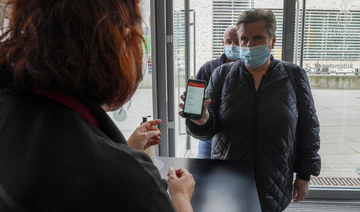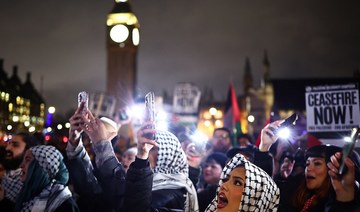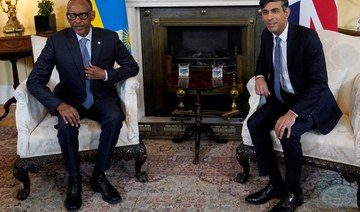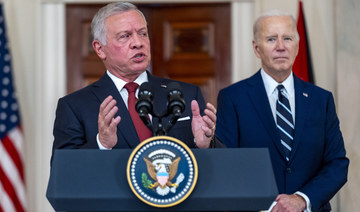COPENHAGEN: Denmark on Tuesday became one of the first European Union countries to scrap most pandemic restrictions as the Scandinavian country no longer considers the COVID-19 outbreak “a socially critical disease.”
The reason for that is that while the omicron variant is surging in Denmark, it’s not placing a heavy burden on the health system and the country has a high vaccination rate, officials have said.
Denmark, a nation of 5.8 million, has in recent weeks seen more than 50,000 daily cases on average while the number of people in hospital intensive care units has dropped.
The head of the Danish Health Authority, Søren Brostrøm, told Danish broadcaster TV2 that his attention was on the number of people in ICUs, rather than on the number of infections. He said that number had “fallen and fallen and is incredibly low.” He said 32 of the coronavirus patients are in ICUs. Several weeks ago, it was up at 80.
The most visible restriction disappearing is the wearing of face masks, which are no longer mandatory on public transportation, shops and for standing clients in restaurant indoor areas. Authorities only recommend mask use in hospitals, health care facilities and nursing homes.
Another restriction that no longer is required is the digital pass used to enter nightclubs, cafes, party buses and to be seated indoors in restaurants.
“I dare not say that it is a final goodbye to restrictions. We do not know what will happen to the fall. Whether there will be a new variant,” Prime Minister Mette Frederiksen told Danish radio.
Health authorities urged Danes to get tested regularly to keep an epidemic surveillance and if needed, “react quickly if necessary,” as Health Minister Minister Magnus Heunicke said last week.
The Danish government has warned that Denmark could see a rise in infections in the coming weeks and said that a fourth vaccination shot might be necessary.
The restrictions were originally introduced in July but were removed about 10 weeks later after a successful vaccination drive. They were reintroduced when infections soared.
In 2020, Denmark became one of the first European countries to close schools because of the pandemic and sent home all non-critical public employees. In neighboring Finland, COVID-19 restrictions will end this month with Prime Minister Sanna Marin saying her Social Democratic-led government would negotiate with the other parties in parliament the timetable for the removal of the measures.
On Monday, border controls at the internal borders between Finland and the other Schengen countries that form Europe’s ID check-free travel area, ended. That restriction was introduced at the end of December to slow down the spread of the omicron variant. Travelers coming from outside the EU will continue to meet border controls at least until Feb. 14. February.
Denmark scraps most COVID-19 restrictions
https://arab.news/2vbus
Denmark scraps most COVID-19 restrictions
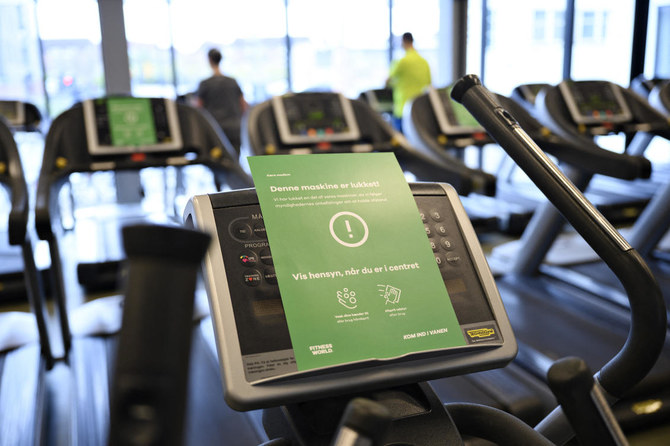
- Authorities only recommend mask use in hospitals, health care facilities and nursing homes
Pro-Palestine Oxbridge students set up encampments

- They are demanding transparency about the universities’ financial links to Israel
- ‘We will not move until our demands are met’
LONDON: Students at the universities of Oxford and Cambridge have set up encampments in support of Palestine, The Times reported on Monday.
Around 50 have refused to leave the lawn of King’s College, Cambridge, while students have also declared a “liberated zone” outside Oxford’s Pitt Rivers Museum.
A banner hung outside King’s College read: “Welcome to the people’s university for Palestine.” Chants of “stop the bombing now” have also been heard on the campus.
The protests have been organized by Oxford Action for Palestine and Cambridge for Palestine.
They are demanding transparency about the universities’ financial links to Israel, which they have described as a “settler colonial state,” and are calling for the end of all investments and endowments from Israeli and Israel-linked companies.
“We have set up camp in university grounds, and we will not move until our demands are met,” the groups said in a statement, adding that the universities are legitimate targets for protests because of their “role in the British empire and its disastrous colonial legacies.”
The Times reported that protesters had been given an itinerary for their involvement including “de-escalation training” and “banner-making.”
A spokesperson for Cambridge University said it is for the college to decide whether to call the police, adding: “The university is fully committed to academic freedom and freedom of speech within the law and we acknowledge the right to protest.
“We ask everyone in our community to treat each other with understanding and empathy. Our priority is the safety of all staff and students.
“We will not tolerate antisemitism, Islamophobia and any other form of racial or religious hatred, or other unlawful activity.”
The relatively small UK protests come after nearly 2,000 people were arrested across the US after widespread demonstrations on over 130 American university campuses about Israel’s ongoing war in Gaza.
Muslim group issues UK Labour Party leader with demands over Gaza
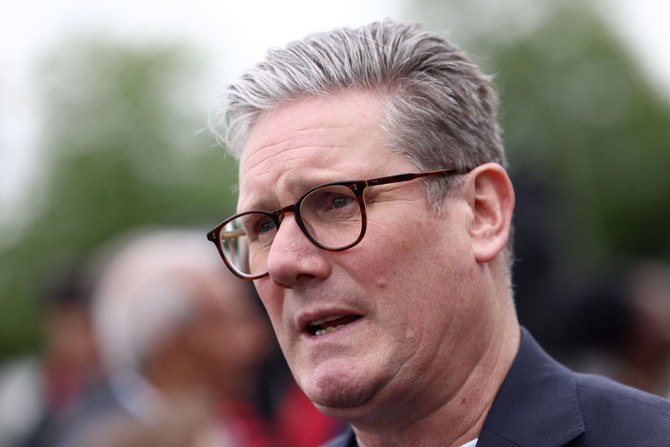
- Muslim Vote group calls for ‘real action’ to regain trust
- Support for Labour in recent local elections fell in areas with high Muslim populations
LONDON: Pro-Palestinian activists have presented a list of 18 demands to the leader of Britain’s opposition Labour Party and said they will not vote for the party at the next general election if he does not fulfill them.
The Muslim Vote, a campaign to get Muslim voters to back pro-Palestine candidates, has called for Sir Keir Starmer to promise to cut military ties with Israel, implement a travel ban on Israeli politicians involved in the war in Gaza and impose sanctions on companies operating in occupied territories.
The group told Starmer he must commit to “real action” and deliver on its requests if he was “serious” about his pledge to rebuild trust with those angered by his stance on the conflict in Gaza, The Telegraph reported.
Supporters would vote for the Green Party or Liberal Democrats if he could not commit to their demands, it said.
Labour’s campaign chief Pat McFadden acknowledged that Starmer’s approach to the conflict had cost the party votes at last week’s local elections. Support for Labour dropped dramatically in areas with a high Muslim populations, including Oldham in Greater Manchester, where the party lost overall control of the council in a shock defeat.
After the result, Starmer said he was determined to regain the trust of those who abandoned Labour as a result of his stance on the Gaza war but did not make any concrete pledges on the matter.
The Muslim Vote challenged Starmer with committing to the 18 demands and implementing them should he become the next prime minister.
They include removing the definition of extremism introduced by Secretary of State for Leveling Up, Housing and Communities Michael Gove and issuing guidance that allows Muslims to pray at school.
Philippines rules out use of water cannon in disputed South China Sea

- Philippines and China have clashed several times in disputed, resource-rich waterway
- Latest skirmish took place late last month, in an incident Manila describes as dangerous
MANILA: President Ferdinand Marcos Jr. said on Monday that Manila will not use offensive equipment in the disputed South China Sea, after China’s coast guard used high-pressure water cannon on Philippine vessels last week.
The Philippines and China have had several confrontations in the resource-rich area, where Beijing has used water cannon against Filipino vessels in incidents Manila has described as harassment and dangerous.
The latest in a string of maritime clashes occurred on April 30 as tensions continued to rise in the vital waterway that Beijing claims almost in its entirety despite a 2016 international arbitration ruling that rejected its assertion.
“What we are doing is defending our sovereign rights and our sovereignty in the West Philippine Sea. And we have no intention of attacking anyone with water cannons or any other such offensive (weapons),” Marcos said Monday.
“We will not follow the Chinese coast guard and the Chinese vessels down that road because it is not the mission of the navy (or) our coast guard to start or to increase tensions … Their mission is precisely the opposite, it’s to lower tensions.”
Philippine vessels have been regularly targeted by Chinese ships in areas of the South China Sea that are internationally recognized as belonging to the Philippines, which Manila calls the West Philippine Sea.
The Philippines’ Ministry of Foreign Affairs last Thursday summoned Zhou Zhiyong, China’s deputy chief of mission, after the incident left a Philippine coast guard vessel and another government boat damaged.
It was the 20th protest Manila has made against Beijing’s conduct in the South China Sea this year alone, while more than 150 diplomatic complaints have been made over the past two years.
Marcos said the Philippines will continue to respond to South China Sea incidents through diplomatic means.
Marcos’s statement comes days after the defense ministers of the Philippines, the US, Japan and Australia met in Hawaii and issued a joint statement on their strong objections to the “dangerous and destabilizing conduct” of China in the South China Sea.
UK considered Rwanda-style asylum deal with Iraq
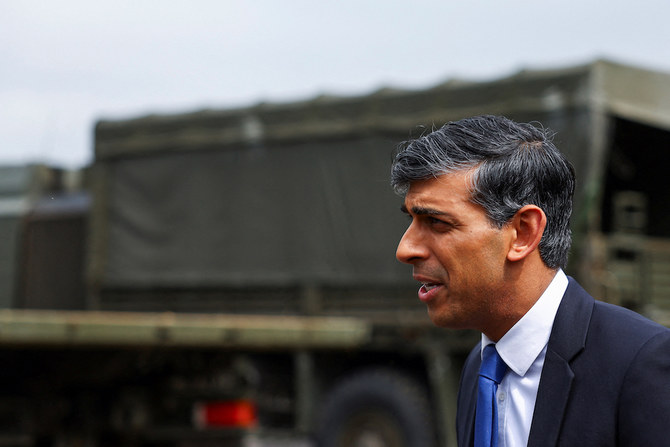
- Documents seen by Sky News reveal London has struck returns agreement with Baghdad
- They also suggest a desire to improve relations with Iran to return people to the country
LONDON: The UK considered sending asylum-seekers to Iraq for processing, new documents have shown.
Iraq is considered very dangerous, with the UK government advising against all travel to the country.
But a plan similar to the Rwanda scheme to process migrants in a third-party country was floated at one stage by Whitehall officials, with negotiations said to have achieved “good recent progress.”
The UK has struck a returns agreement with Baghdad for Iraqi citizens, which was achieved without a formal announcement or acknowledgement and a plea for “discretion,” the documents, seen by Sky News, suggest.
The cache of papers casts new light on the UK government’s approach to dealing with asylum-seekers and illegal migration, including a desire to improve relations with the Iranian Embassy in London in order to ease the repatriation of Iranian citizens, and moves to establish return agreements with Eritrea and Ethiopia.
Biden meets Jordan’s King Abdullah as Gaza ceasefire hopes dim
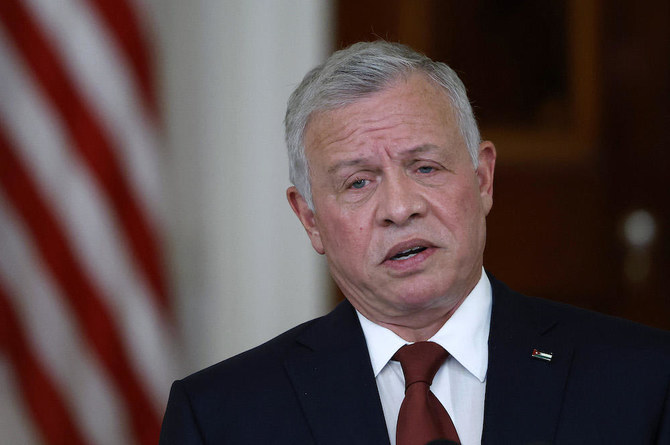
- Monday’s meeting between two leaders is not a formal bilateral meeting but an informal private meeting
- US president Biden faces increasing pressure politically to convince Israel to hold off on an invasion
WASHINGTON: President Joe Biden will meet Middle East ally, Jordan’s King Abdullah II, at the White House on Monday with prospects for a Gaza ceasefire appearing slim and Palestinian Islamist group Hamas and Israeli officials blaming each other for the impasse.
On Sunday, Hamas reiterated its demand for an end to the war in exchange for the freeing of hostages, and Israeli Prime Minister Benjamin Netanyahu flatly ruled that out. Hamas also attacked the Kerem Shalom crossing into Gaza that Israel said killed three of its soldiers.
A Jordanian diplomat said Monday’s meeting between Biden and King Abdullah is not a formal bilateral meeting but an informal private meeting. It comes as the Biden administration and Israeli officials remain at odds over Israel’s planned military incursion in Rafah.
Biden last met King Abdullah at the White House in February and the two longtime allies discussed a daunting list of challenges, including a looming Israeli ground offensive in southern Gaza and the threat of a humanitarian calamity among Palestinian civilians. Jordan and other Arab states have been highly critical of Israel’s actions and have been demanding a ceasefire since mid-October as civilian casualties began to skyrocket. The war began after Hamas stunned Israel with a cross-border raid on Oct. 7 in which 1,200 people were killed and 252 hostages taken, according to Israeli tallies.
Biden last spoke to Netanyahu on April 28 and “reiterated his clear position” on a possible invasion of the Gaza border city of Rafah, the White House said. The US president has been vocal in his demand that Israel not undertake a ground offensive in Rafah without a plan to protect Palestinian civilians.
With pro-Palestinian protests erupting across US college campuses, Biden faces increasing pressure politically to convince Israel to hold off on an invasion. Biden addressed the campus unrest over the war in Gaza last week but said the campus protests had not forced him to reconsider his policies in the Middle East.



